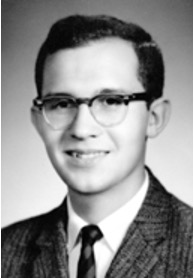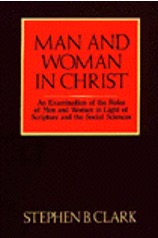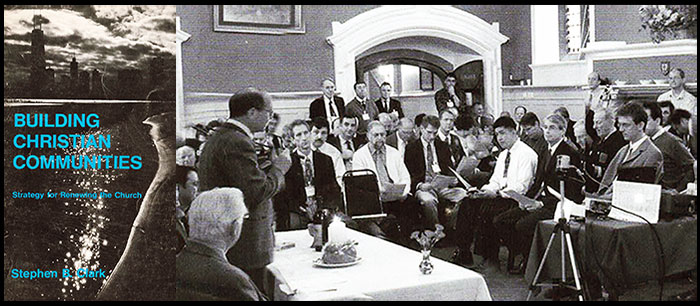A Brief Overview of Stephen B. Clark’s Life in the Development of Covenant Community
Steve Clark was born on June 1, 1940, in New York City (USA). He attended Bellerose Public School on Long Island and then received a scholarship to attend Peddie Boys School in Hightstown, New Jersey.
In 1958 Steve began his university studies at Yale University in New Haven, Connecticut, intending to major in history. It was there, in 1960, that he came to a more personal faith as he looked to ground his life in the truth.
Reading about Christianity convinced his intellect, but two books about Francis of Assisi – The Little Flowers of Saint Francis and The Mirror of Perfection – were key in bringing him to a personal faith. In reading these books he saw that being a Christian involved a living, personal relationship with Jesus Christ: there was more to faith than intellectual assent. Like Francis, Steve quickly decided even more was needed. Francis of Assisi had made a decision to live as a radical disciple of Christ. This call to radical discipleship provided the vision for Steve to decide to live single for the Lord and to call others to serious personal discipleship.
While at Yale, Steve was also involved with the Morehouse Catholic Chaplaincy. He studied Catholicism in depth and decided to be baptized. When Steve presented himself for baptism, the priest quickly discovered there was no need to teach him the catechism – Steve had already studied it extensively. The Catholic chaplaincy at Yale had what they called a community, and it was, in part, this attempt at community that began to form the basis of Steve’s vision for building a community of disciples on mission. He saw that those who were involved in Christian activities together grew in faith and holiness, while those who only attended church on Sunday seemed to struggle with their faith and often left the Church during their college years.

After graduating from Yale in 1962, Steve spent a year studying philosophy and learning German on a Fulbright Scholarship at the University of Freiburg in Germany.
In the autumn of 1963 he returned to the United States and began to pursue a doctorate at the University of Notre Dame, in South Bend, Indiana. There, he connected immediately with the Cursillo Movement, a retreat-based renewal movement he had previously encountered as a summer missionary in Latin America.
Cursillo seemed like it might be a vehicle for forming mission communities with an evangelical focus. At that time Cursillo was only beginning in the United States and according Cursillo’s rules, Steve was still too young to attend or lead a retreat. Nonetheless, he attended one in East Chicago, Indiana. Two months later he helped put on the very first Cursillo retreat to be held in South Bend. In less than two years he was asked to give the opening address at the National Cursillo Convention in Kansas City and to serve on the National Secretariat in East Lansing.
Steve and the other young leaders of Cursillo were also curious about the apparent spiritual power found in Pentecostalism. They decided to read The Cross and the Switchblade and They Speak with Other Tongues, and so were prepared by the Lord for what he was about to do in pouring out his Spirit anew.
Early in 1967, the charismatic renewal erupted in the Catholic Church. Steve was among those first to be “baptized in the Holy Spirit.” He became one of the renewal’s leading spokesmen and authors, writing Baptized in the Spirit and Spiritual Gifts, Finding New Life in the Spirit, Growing in Faith, and Knowing God’s Will.
In the autumn of 1967 Steve, together with Ralph Martin, Gerry Rauch, and Jim Cavnar, moved to Ann Arbor, Michigan where the University of Michigan was located. It was there that the first charismatic covenant community emerged. These four began a charismatic prayer meeting that met on Thursday night in an apartment above Campus Corner Drug Store with a dozen people attending. Within weeks, more than one hundred people were attending, so they moved the prayer meeting to the basement of St. Mary’s Student Chapel. People began coming from all over the American Midwest, some driving four hours each way to learn more about the work of the Holy Spirit.
Soon a second weekly prayer meeting was started. Bruce Yocum, one of those involved in the beginnings of community, noted:
“We wanted something more that could focus on our own relationships with one another in Ann Arbor. So we started a Monday night meeting in addition to the Thursday meeting. God began to lead us into something deeper. In the summer of 1969 we began to receive prophecies about “covenant.”
We didn’t understand this very well, so we started doing a Scripture study on “covenant” which led pretty quickly to the idea of Christian community. By the beginning of 1970, we were talking about establishing a community by making significant commitments to one another.
Among these commitments were those made by the men living single for the Lord as Servants of the Word. Steve was founding a brotherhood of celibate men as part of his vision for building a bulwark of communities.”

From his time at the Morehouse Catholic Chaplaincy at Yale, to his involvement in Cursillo, and during the early days of the charismatic renewal, Steve had been developing his thoughts and vision for Christian community. They provided the basis for the book Building Christian Communities. Soon, communities began springing up, not just in North America, but in Europe, Asia, Latin America, and Lebanon.
Steve began writing Man and Woman in Christ in the 1970s at a time when feminism was front-page news. But this book is about much more than the roles of men and women. It also gives an assessment of the contemporary state of the Christian people as well as a vision for what it could be, and the means to make that vision a reality. Steve completed Man and Woman in Christ in 1980, and it was selected in 1981 by the evangelical magazine Christianity Today as one of the significant books of the year.
In his forty years of leadership in the communities movement, Steve has written more than twenty books and several hundred articles – and most importantly, he has taught and discipled the main leaders of what is today the Sword of the Spirit. It is his original vision for evangelistic communities that continues to form and shape that work today. Steve Clark’s term as President of the Sword of the Spirit will end in May 2009. His leadership, we hope and pray, will continue many years thereafter.
This Brief Overview of Steve Clark’s Life in the Development of Christian Community by Mike Shaughnessy was first published in the May 2009 issue of Living Bulwark.
- See articles by Steve Clark in Living Bulwark archives.
Top photo credits: Building Christian Communities book cover and Steve Clark addressing the International Sword of the Spirit Coordinators Meeting at a conference center near London, UK in May 2004 © The Sword of the Spirit
Mike Shaughnessy is a lifelong member of the Servants of the Word, an international ecumenical brotherhood of men living single for the Lord. He is a prolific writer. He has written extensively about youth work and currently leads Grandly, a ministry helping grandparents pass on their faith to their grandchildren. He lives in Lansing, Michigan USA.



